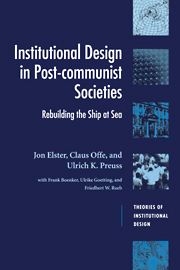Book contents
- Frontmatter
- Contents
- Acknowledgements
- Abbreviations
- 1 Introduction: agenda, agency, and the aims of Central East European transitions
- 2 Mapping Eastern Europe
- 3 Constitutional politics in Eastern Europe
- 4 Building and consolidating democracies
- 5 Building capitalism in Eastern Europe
- 6 Social policy transformation
- 7 Consolidation and the cleavages of ideology and identity
- 8 Conclusion: the unfinished project
- References
- Index
7 - Consolidation and the cleavages of ideology and identity
Published online by Cambridge University Press: 20 January 2010
- Frontmatter
- Contents
- Acknowledgements
- Abbreviations
- 1 Introduction: agenda, agency, and the aims of Central East European transitions
- 2 Mapping Eastern Europe
- 3 Constitutional politics in Eastern Europe
- 4 Building and consolidating democracies
- 5 Building capitalism in Eastern Europe
- 6 Social policy transformation
- 7 Consolidation and the cleavages of ideology and identity
- 8 Conclusion: the unfinished project
- References
- Index
Summary
The question that is to be addressed in this chapter is this: What kinds of actors, cleavages, and conflicts that are specific to the CEE post-communist transition play either a favorable or unfavorable role in the process of institutional consolidation? Consolidation means, first of all, a condition in which conflict is limited and contained within a framework of enforced and recognized rules. Instead of exclusion and violence carried out between enemies, consolidation is a condition in which mutual recognition, civilized conflict, and compromise between opponents prevails. Consolidation means that a recognized “form” is available to reconcile or make livable any “substance” of conflict. Actors refrain from – or are effectively discouraged from – challenging the rules according to which conflict is to be carried out, and agents within recognized institutional domains are endowed with rights and resources that allow them to practice their autonomy. As argued in more detail toward the end of chapter 1, consolidation is equivalent to the routinization of conflict and the pluralization of domains. To put it in negative terms: If consolidation is accomplished, no one appeals to “sacred causes” or substantive “higher reasons” that are held to be more valid than existing rules; and no one trespasses demarcation lines that define societal domains.
Categorical conflicts and class conflicts
We start with two assumptions. First, the societal conflicts that typically occur within post-communist societies are of a nature other than class conflicts. To be sure, the state socialist formation must not be confused with a “classless” society.
- Type
- Chapter
- Information
- Institutional Design in Post-Communist SocietiesRebuilding the Ship at Sea, pp. 247 - 270Publisher: Cambridge University PressPrint publication year: 1998
- 2
- Cited by



